
June 9, 2025

It is a common misconception that the proceeds of crime regime will trump other claims or interests. The Supreme Court has reaffirmed that is not the case and that third party property rights mostly cannot be interfered with by the Proceeds of Crime Act 2002 (“POCA”). In its decision in Crown Prosecution Service v Aquila Advisory Ltd, the Supreme Court held that a company’s claim against its directors for secret profits obtained in breach of fiduciary duty took precedence over a confiscation order obtained by the Crown in terms of POCA.
The directors of Vantis Tax Ltd (“Vantis”) created schemes with enabled third parties to make false claims for tax relief. The schemes enabled share values of other companies to be fraudulently increased by the companies acquiring assets. The assets were allegedly sold to the companies by the directors’ spouses. However, there was in fact only one asset which was owned by Vantis and it was never sold by Vantis. The directors received payments through the scheme totaling £4.55 million. The directors (but not Vantis) were prosecuted and convicted of tax fraud. Following the conviction, the Crown obtained confiscation orders against each of the directors. Vantis had a claim against the directors for making secret profits in breach of their fiduciary duties and for breach of constructive trust. It sold its claim to Aquila Advisory Ltd (“Aquila”) who were the respondent in this case.
Aquila argued that its claims took precedence over the confiscation order as the directors’ assets were held in the constructive trust. Once the secret profits were made, the directors had a duty to account for them and the secret profits were held in constructive trust. The company was the beneficiary of the constructive trust and had a proprietary interest in it.
The Crown put forward a number of arguments in response. They argued that the directors’ fraudulent tax scheme was being pursued through the company and so the claim for secret profits was tainted by illegality and should therefore fail. Alternatively, they argued that the confiscation order should trump the company’s claim as to do otherwise would allow the company to acquire assets that had been generated by the criminal acts of its directors. It accepted that POCA had some protections for third party property rights but argued that those only applied to innocent third party purchasers who pay market value for criminal property.
The Supreme Court affirmed its own decision in Bilta (UK) Ltd v Nazir [2016] AC 1 (“Bilta”) in determining that the illegal acts of the directors could not be used to defeat the company’s claims for breach of fiduciary duty. The usual approach to the attribution to the company of the knowledge and acts of its directors did not apply where the company was suing the directors for breach of fiduciary duty. The Supreme Court did not see any reason to depart from Bilta in the circumstances of the Aquila case.
The Supreme Court also had no truck with the alternative argument for the Crown. It emphasized that the protections in POCA were broader than just innocent third party purchasers and instead protected the property rights of others regardless of how those rights arise. (The only exception to that was tainted gifts.) Here Aquila had a proprietary claim in the constructive trust. That proprietary claim took priority over the Crown’s confiscation order. The directors’ assets were to go to Aquila and not to the Crown.
The Crown will, no doubt, be disappointed by the Supreme Court’s decision. However, the Supreme Court did indicate an alternative route for the Crown to avoid a similar outcome in future. The Crown ought to have included the company in the criminal indictment and, following conviction, sought a confiscation order against the company. Alternatively, instead of seeking a confiscation order, it could have sought to recover the property in terms of the civil recovery provisions of the Proceeds of Crime Act 2002. It may be that this decision will see more companies being involved in criminal proceedings rather than just their directors.
The critical element of this decision is that Aquila had a proprietary claim – the interest in the constructive trust – which trumped the Crown’s personal claim in the confiscation order. Scots Law has (reasonably recently) recognised constructive trusts. However, Scots Law does not replicate the English concept of a proprietary interest of the beneficiary in the constructive trust. A beneficiary of a Scots Law trust has no real right of ownership in the trust property and instead has a bundle of personal rights against the trustees which should compel the trustees to administer the trust property appropriately. If the circumstances of Aquila were to occur in Scotland, the Crown and the company would each have personal claims to the director’s assets. Without the protection of a proprietary claim, a Scots company may lose out to the confiscation order.
While Scots Law does not treat a beneficiary as having a real right to trust property, if a trustee is sequestrated, the trust property does not vest in his trustee in sequestration. Instead it is available to the beneficiary. POCA mimics in some respects the insolvency regime. It could be argued that the way trust property is dealt with in insolvency matters in Scotland ought to be applied in POCA cases. Until we have a case like Aquila in Scotland, it will remain a matter of debate.
Should you have any questions on this article, please contact: Eilidh MacEwan by email: emacewan@gilsongray.co.uk